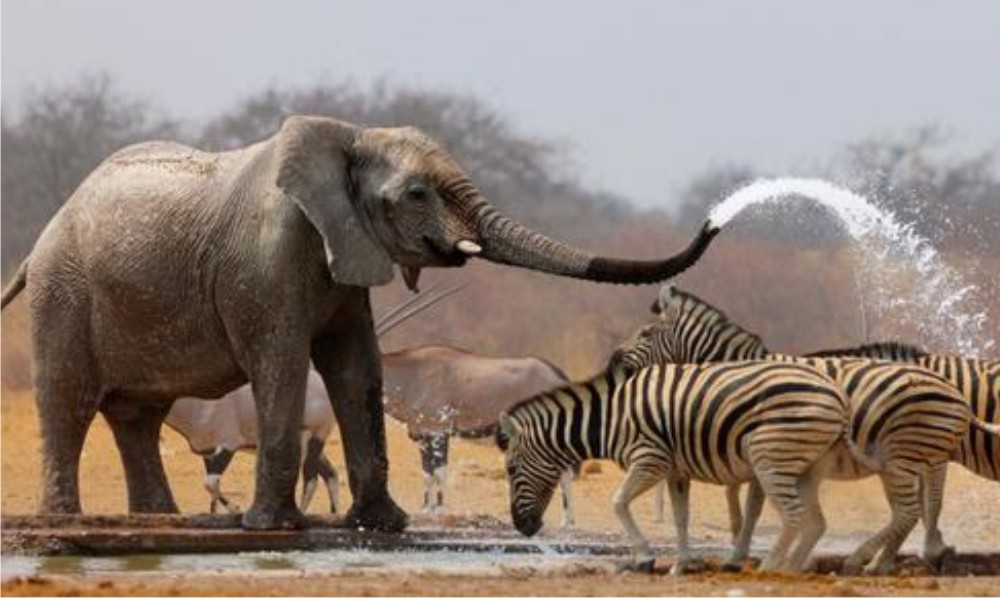
5 Things to Know About Yankari Game Reserve

Yankari Game Reserve or Yankari National Park is a large wildlife park located in the south-central part of Bauchi State, in northeastern Nigeria. It covers an area of about 2,244 square kilometres (866 sq mi) and is home to several natural warm water springs, as well as a wide variety of flora and fauna. Its location in the heartland of the West African savanna makes it a unique way for tourists and holidaymakers to watch wildlife in its natural habitat.
Yankari was originally created as a game reserve in 1956, but later designated Nigeria’s biggest national park in 1991. It is the most popular destination for tourists in Nigeria and, as such, plays a crucial role in the development and promotion of tourism and ecotourism in Nigeria. It is also one of the most popular eco-destinations in West Africa.
Tourism on the Yankari game reserve is one perfect way to spend your vocation. Besides increasing your knowledge about nature and history, the Yankari game reserve gives you a perfect feeling of comfort and relaxation, enjoying the interesting view of wildlife and nature’s gift.
However, if you haven’t been to the Yankari Game Reserve before, this article has brought you some important and remarkable things you need to know about the gigantic YANKARI GAME RESERVE.
5 Things to Know About Yankari Game Reserve
-
Wildlife
Yankari Game Reserve has rich wildlife resources. The park is an important refuge for over 50 species of mammal including African bush elephant, olive baboon, patas monkey, with antelopes (roan, waterbuck, bushbuck, and hartebeest), elephants, hippopotamuses, giraffes, baboons, hyenas, lions, leopards, and crocodiles.
The Yankari Game Reserve is home to Nigeria’s largest surviving elephant population, estimated at 350 individuals. Yankari is recognized as having one of the largest populations of elephants in West Africa, estimated at more than 300 in 2005. The growth of the elephant population has become a problem for surrounding villages at times as the animals enter local farms during the rainy season. The elephants have also stripped the park of many of its baobab trees.
-
The WIKKI Warm Springs
If you like to just relax on holiday, you won’t want to miss the calming waters of the Wiki warm spring. The Wiki Warm Spring is the biggest of the four warm springs in Yankari! It is said to have come about as a result of geothermal activity below the park. The name ‘wiki’ is derived from the Duguri language meaning ‘where are you?’ The spring is Mother Nature’s answer to a spa with a consistent temperature of 31°C which boasts crystal clear waters and flows into a beautiful lake which is 200 meters long by 10 meters across and nearly two meters deep, making it the perfect spot for a swim. The spring provides visitors with a chance to enjoy the warm water and relax in a tranquil environment, surrounded by nature. It is the biggest and deepest of all the four warm springs found in the park!
-
The Educational Museum
Located in the Wiki Camp is the museum of natural history with an incredible exhibit. Aside preserving history, the educational museum also serves as a conservation center where tools and battle weapons right from the 19th century can be found. The museum is stocked with varieties of skins, tusks and bones from ancient times. However, the best way to get full details on the Yankari Game Reserve Museum is experiencing it yourself!
- The Yankari Game Reserve and Resorts
Also found in the wiki camp is the one stop Yankari game reserve and resorts, a perfect place for tourists and travelers. The resort has rooms categorized in form of Student Hostel, Studio Suite, Luxury Double, VIP, Corporate Villa and the Marshal Suite. And guess what? These rooms come with awesome facilities such as private bathrooms with bathtubs, telephones, constant power supply plus free wireless internet access and lots more!
The Yankari Game Reserve Resort also prides itself with outdoor facilities like the restaurant with both national and international cuisines, standard security and the use of CCTV cameras, adequate parking lot, children’s playground, daily newspaper delivery plus extra services like laundry and ironing.
-
The Kalban Hill
The Kalban Hill is the icing on the cake at Yankari. After a drive through the park, you can hike to the Kalban hills and explore relics of ancient settlements in the Marshall Caves and old iron. Kalban hill, meaning ‘flat piece’, is a flat topped hill which stands northeast of Wikki Camp as a common stopping area for the daily safaris in the park. From the top of the hill, tourists can get a perfect view of the Yankari Park.